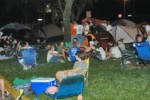New policy needs work

Camping out, skipping class and bribing friends: these are just some of the things USF students did to try to get football tickets during the Bulls historic 2007 season.
Obviously, the ticket policy needed some work. It seemed as though every week students had a new procedure to follow. For the upcoming football season, the athletic department has come up with a new system, which includes attending other sporting events, participating in events sponsored by the athletic department and playing the lottery in order to increase a student’s chance of receiving a ticket.
That doesn’t sound like much of an improvement.
The new ticket system is part loyalty, part chance. Students will register for an online account and accrue points for attending athletic events (one point for football and men’s basketball games, with more points awarded for attending baseball, softball or soccer games). Tickets will be “purchased” and distributed online.
The 25 percent of students who accrue the most points – or, the most loyal 25 percent of students – will be guaranteed a seat at football games.
The remaining 75 percent of students will be entered into a lottery – the more points (a total of which will be viewable via an online account) a student has, the more likely it is that he or she will receive a ticket.
This system may cut down on students camping out in front of the Sun Dome, but it doesn’t mean it is the best way to go about this.
“We want to reward the most passionate fans, those that are attending the most events,” Associate Athletic Director Bill McGillis said. “And, we think this kind of system will help drive some attendance and increase the student environment at baseball, soccer and softball.”
It’s nice to reward students for being loyal, but the new ticket policy awards no points for attending non-revenue sporting events – such as tennis or track – nor does it award points for attending club sporting events.
“There are no tickets at tennis matches, so it might make a tracking system hard for a sports like tennis,” men’s tennis coach Don Barr said. “I would definitely like to see the athletic department promote non-revenue sports, because our athletes work just as hard as any other athletes in the Big East.”
The policy also gives an advantage to students who do not have jobs outside of class, as well as students who live on campus.
The policy has several areas that could use improvement, but it does have a good strategy behind it: increasing attendance at events that do not take place at Raymond James Stadium.
Athletics is taking strides to keep teams from playing in front of half-capacity crowds at the Sun Dome or Red McEwen Field. The loyalty system will also only go into effect if tickets are sold out to either football or men’s basketball games.
“One main point of this new distribution system is that it’s different when demand exceeds supply,” McGillis said. “If demand doesn’t exceed supply then we don’t get into the whole loyalty system.”
There are policies, however, used at other universities that seem to make more sense.
At the University of Florida, students call a phone number and provide their student information. Tickets – which are sold to students – are disbursed based on class standing: seniors have the highest chance of getting a ticket, with juniors, sophomores and freshmen having progressively lower percentages.
Florida State University has students enter their ticket information online eight days before each home football game. Once the students’ information is entered, they are placed in a “virtual line” with tickets being passed out the following Monday.
The University of South Florida studied the ticket policies of universities such as Maryland, Rutgers, Kansas and West Virginia when developing the new policy.
Students’ loyalty to USF is a good thing. It’s also a good thing for students to support their University.
Rewarding students by “encouraging” them to attend athletic events around campus – which they may or may not want to attend in the first place – is unfair. Students have obligations that may prevent them from attending mid-week games – which baseball, basketball, softball, soccer and football sometimes have.
Rewarding some should not come at the expense of punishing others.






